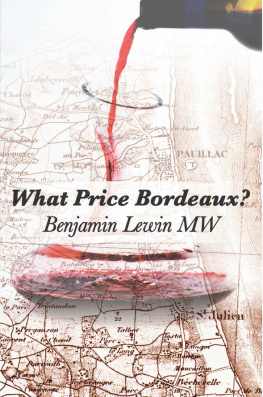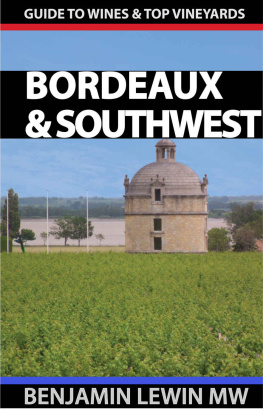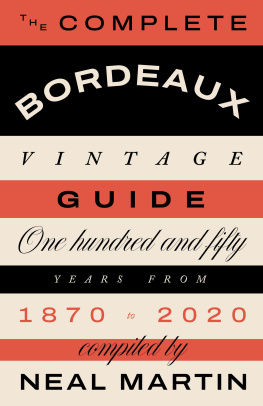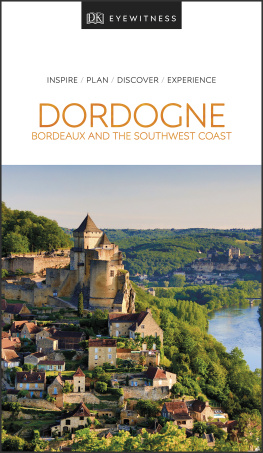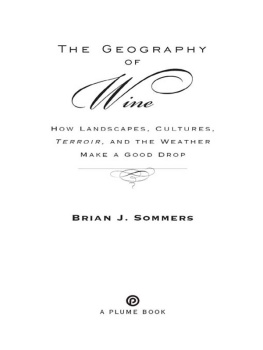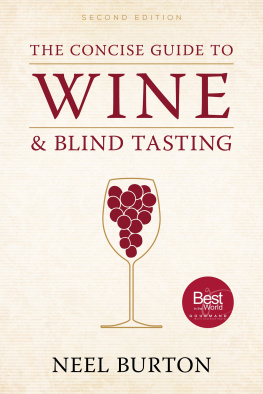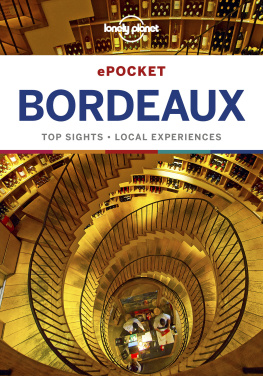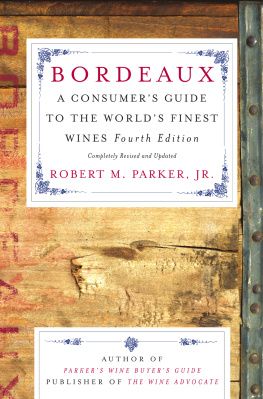Copyright 2009 by Benjamin Lewin
All rights reserved. Published in the United States
by Vendange Press.
Lewin, Benjamin
What Price Bordeaux / by
Benjamin Lewin
ISBN 978-0-9837292-2-8
Without limiting the rights under copyright reserved above, no part of this publication may be reproduced, stored in or introduced into a retrieval system, or transmitted, in any form or by any means (electronic, mechanical, photocopying, recording or otherwise) without the prior written permission of both the copyright owner and the above publisher of the book.
All enquiries should be directed to
contact@vendangepress.com.
We were on one of our research visits to Bordeaux. The plane from London taxied slowly into the terminal. We disembarked and walked in a line of passengers to immigration. The immigration booths were locked up and abandoned; there was no way through into the deserted airport. My wife turned to me and said, Now youve gone and done it. She had been saying for ages that my incessant requests to the French authorities as I tried to establish the real facts behind the Bordeaux wine industry would get me banned from France. Bordeaux is one of the greatest places on earth for producing fine wine; but it has a mystique based on centuries of obscurity about details, and the light of transparency is rarely welcome. The security alert that had closed the airport was a good metaphor.
All had seemed friendly when I started the project, but things changed quickly at any attempt to delve below the superficial. When the Conseil des Grands Crus Classs heard I was writing a book, they immediately offered assistance in finding documents or photographs. But when I raised the sensitive question of whether information could be found on the land holdings of the great chteaux when they were classified in 1855, the answer started with Malheureusement. Another professional organization, the CIVB, were at first happy to provide general information about the economics of Bordeaux production, but clammed up when we got down to fine details about sales in individual sectors. (They would not even tell me the average price of a bottle of red Bordeaux in 2007!)
It has been an interesting expedition trawling among the records to establish what really goes on in Bordeaux. Putting it all together, I have wary respect for the success of the Bordelais in building a powerful wine industry whose top wines have unrivalled quality and fetch unprecedented prices, but despair at their inability to recognize long-term over short-term interests and to deal with the endemic problems of generic wines; admiration for the top wines but dismay at the inability to stop the more obvious abuses; and concern as to whether traditional Bordeaux will survive the flying winemakers and future global warming.
Bordeaux is a place like no other. The range of quality runs from plonk to the finest on earth; the classification system is uniquely based on price but differs from place to place; wine production is tightly regulated as elsewhere in France, but when it comes to naming a wine you could drive a trailer load of jeroboams through the loopholes. In this book I have tried to establish the underlying realities of Bordeaux. What really goes on in the glittering palaces of the Grand Cru Classs and the extensive caves of the negociants? And of course the basic running theme is what this means for the consumer, and how is it possible to determine before purchase what lies inside that expensive bottle of Bordeaux?
Picking up the wine list in a shop or restaurant, under the heading Bordeaux you may well be faced with a price range from less than $10 to more than $1000. Superficially there is little to distinguish these wines: all are described as Chteau Quelquechose. All the bottles bear a label stating Appellation Contrle, accompanied by the name of a wine-growing region. Regional descriptions vary from Bordeaux for the cheapest to Pomerol for the most expensive, yet in each region there is a wide range of prices, so the description does not necessarily carry any obvious implication. A handful of wines may be picked out as having a classification such as Grand Cru Class, but this means different things in different parts of Bordeaux. None of the labels identify grape varieties, yet some wines will be made predominantly from the austere Cabernet Sauvignon and others from the lush Merlot. Without any systematic description, how are these wines to be distinguished? What does regional description mean in Bordeaux? Does classification have any significance? What is the relationship between quality and price? Here I analyze these questions, from the rich wine-growing history of Bordeaux to the problems of today.
Bordeaux is full of paradoxes. The entire system of wine production in France is based on the notion of the supremacy of terroir, the distinctive and unchangeable quality of each individual vineyard plot. Yet man created the terrain of the Mdoc, the most famous part of the wine region, when Dutch engineers drained the marshes in the 17th century, affecting drainage all around. The international reputation of Bordeaux was established by the classification of its top properties in 1855; yet the landholdings of these Grand Cru Classs have changed extensively since then without their classification being in the least affected. The top wines of Bordeaux are in such worldwide demand that the best vintages can scarcely be had for love nor money; yet generic wines are being sent for distillation because they cannot be given away at any price. Faced with the challenge from the New World, some chteaux have turned to a more international style of wine production, standing on its head the original attempt of New World producers to make wines that would compete with Bordeaux; now Bordeaux is making wines more like those of Napa Valley in California.
After losing a battle with France, Mary Tudor, Queen of England, said that after her death, Calais would be found engraved on her heart. Many have similar feelings about Bordeaux: we respect it for establishing a paradigm that at its best is rarely, if ever, equaledbut at the same time we are filled with rueful exasperation at the ways of the Bordelais and concerned at possible loss of its traditional character. There are all too many laments about the globalization of wine, not merely in Bordeaux for that matter, and the arguments are often full of fury but short on facts. Here my approach is more quantitative than has been common for a subject that is usually viewed somewhat subjectively. I have done my best to dig out the facts that underlie what actually goes into the bottle, which are not always easy to establish. From this starting point, it becomes possible to base the debate on reality and, perhaps, to see where Bordeaux is going.
Thanks are due to many chteaux proprietors for information gained in the form of fascinating exchanges by correspondence or by visits to the chteaux, and also to those negociants and courtiers who allowed me access to their records of prices on the Place de Bordeaux. Given the inflammatory nature of the process of classification in Bordeaux, the conclusions suggested by these prices are likely to be controversial, and I believe that people would prefer not to be thanked by name, but my heartfelt thanks anyway. I am also indebted to archivists in Bordeaux and elsewhere who dug out files on the 1855 classification and other matters that had been carefully buried in obscurity. Additional thanks are due to Bill Blatch, Jean-Michel Comme, and Peter Sichel for their helpful comments on all or part of the manuscript. And the work would never have been finished without the efforts of Ann, my wife and indefatigable tasting companion.
Next page
